THE RUSSIAN PEASANTRY.* THIS, the third of the works which
Stepniak has given to the English public in their own language, will probably be deemed the most important, as it is certainly the most solid and elaborate, which he has yet produced. It is important not merely because of its interesting and original presentment
• The Russian Peasantry : their Agrarian Condition, Social Life, and Religion. By Stopniak. London : Swan Sonnensehein, Lowrey, and Co. of facts which to most people will be a revelation, but by reason of its subject. For Russia, though ruled by an autocracy, is essentially a peasant State. Peasants constitute the vast majority of the population ; they pay nearly the whole of the taxes, form the rank and file of the Army, and the mainstay of the Throne. So long as the autocracy is supported by the moujik, not all the efforts of the educated and the discontented can prevail against it ; but the Czar who forfeits the support, or even incurs the distrust of the rural population, will lose his power, though he may con- ceivably keep his crown. When the peasants cease to believe in the autocracy, the autocracy must cease to be. Hence, to know the peasantry is to know Russia, and without some knowledge of their economic condition, their aspirations and their ideals, it is impossible either to understand the crisis through which the country is now passing, or to make any attempt to forecast its results. For imparting this knowledge, Stepniak possesses peculiar and unique qualifications ; he has lived among the peasantry, lodged with them, fed with them, and worked with them ; he has also made himself thoroughly familiar with the literature of the subject, and he writes our language with singular clearness and force. Most of his statements must needs be taken on trust ; for albeit he is always careful to cite his authorities, there are few English critics who have the linguistic and other knowledge necessary to verify his references. On the other hand, his character for painstaking accuracy is too well established to require vindica- tion. The Russian Government and its defenders have the strongest motives for impugning Stepniak's good faith; yet, so far as we are aware, no attempt has yet been made to convict him either of deliberate unveracity or unconscious exaggeration ; and his accounts of the treatment of political offenders, which at the time of their publication were regarded as somewhat sensational, have been fully confirmed by the independent testimony of Mr. George Kennan, the American traveller, whose recent articles on the subject in the Century Magazine have attracted so much attention.
It should be observed, in the first instance, about the Russian peasantry—the fact being essential to a right comprehension of the question—that they are worse off materially as freemen than they were as serfs,—not because they have abused their freedom, but because of the onerous conditions by which the boon was burdened. Under the old system, the serfs were never divorced from the land; they worked alternately for their masters and for themselves, living on the produce of their allot- ments; and as they bad neither rent nor taxes to pay, they and their families had always enough to eat. Unfortunately, however, the freed peasants were given much less land than they had previously cultivated, partly because the Government favoured the landlords, or rather landlordism, partly because it shrank from incurring the pecuniary liabilities which a more liberal scheme would have involved. With the Russian climate and system of husbandry, a peasant family, averaging seven or eight individuals, can cultivate fifty-four acres. As a matter of fact, the peasants received on the average less than half this pro- portion. So parsimoniously was the land distributed among them, that the great majority are unable to provide them- selves with the first necessaries of life. With few exceptions, they are compelled to look to wage-labour, mostly on their former owners' estates, as an essential and often the chief source of their livelihood. They are, moreover, heavily bur- dened with taxes. Ten years after Emancipation, " when the first alarming symptoms of impoverishment among the peasants appeared," the Government appointed a Commission to inquire into their condition, according to whose report, as quoted by Stepniak, the class of former State peasants in thirty-seven provinces of the Empire pay in taxes of every description no less than 92.75 per cent. of the average net pro- duce of their land. There are others who, according to the same authority, " pay a total taxation amounting on an average to 198.25 per cent. of the net produce of the land." The natural impulse, on reading this latter statement, is to set it down as either a mistake or a misprint, since even Russian peasants, land-hungry as they may be, would hardly consent to pay in taxes twice as much as their farms produce. The solution of the enigma lies in the smallness of their holdings, and the smaller the holding, the higher it is taxed—of course relatively —and the more time has the peasant at his disposal for outside work. As may be supposed, however, there are differences, some peasants not being compelled to hand over to the State
more than half the net produce of their farms. The average is said to be 45 per cent. of the whole family income (indus- trial work included). In other words, the Russian peasant is constrained, under pain of being flogged and sold up, to work three days a week for the State. To this extent he is as much a serf as he was before the Emancipation. To this extent, too, he has changed the rule of King Log for King Stork, the new tax-gatherer being a far harder taskmaster than the old seigneur. No wonder that, in these circumstances, the hard-pressed peasant should fall into the hands of local Shylocks, known as Ifeulaks, literally mir-eaters. Of these, there are three classes,— the peasant who, by good luck and shrewd management, has saved money and raised himself above the common herd; the regular landlord who ekes out his income by usury, or the new man who has stepped into his shoes ; and the tradesman with spare capital, who finds lending money, or kind, at cent. per cent. a better business than retailing i goods at the ordinary rate of profit. Sometimes the peasants of a mir borrow on their joint responsibility and the security of their holdings; when an individual peasant borrows, he hypothecates himself, —that is to say, he enters into an agreement to perform a certain amount of work, measured by days, whenever he may be called upon by the lender to do so, an amount always fax exceeding the money-value of the sum lent. The peasants who borrow on these terms, and they are reckoned by millions, are known among their fellows as " bondage-men," and " bondage-men " they generally remain. When they escape for a season, they are almost sure, ere long, to be again entangled in the toils i-
" After discharging out of his modest and very strained re- sources such exorbitant claims as I have described [writes our author], the peasant will, generally speaking, be worse off the next autumn than he was the year before. He will have greater difficulty in defraying the taxes and providing for his own wants. Unless unusually good luck befall him, he will be obliged during the winter to apply once more, and probably for a larger advance, to his benefactor; Very often he will have been unable to execute all the heavy obligations previously undertaken. Some arrears will still remain to be added, with accumulated interest, to his debt of work, a debt from which he can never, except by the help of some windfall or godsend, escape. Only very large families, which are becoming less common, are able to extricate themselves from the usurer's net in which they have been by dire misfortune entangled. When the liability is divided amongst twelve or more adults, they may compensate for the absence of one or two of their number 'given in bondage' by increased diligence on the part of those that remain. But small families almost inevitably succumb. M. Trirogoff tells us that the peasants them- selves are convinced that when a man has once been caught by the rural usurer, he must remain in bondage' to the end of his days. And in nine cases out of ten this proves true."
This is the track system under a new guise, and enforced by law. The labourer receives an advance which, together with the interest (seldom under cent. per cent., and generally more) is stopped out of his wages. In the Samara Province, the money-lenders charge 300 per cent. ; in Tamboff, 108 ; in Kieff, 166 ; in Kamenz-Podolsk, 200, for a period which, as a rule, does not exceed eight months ! The great majority of the indebted, after being " sold up " and turned adrift, become wanderers and beggars. " One-third of our formerly inde- pendent peasants are reduced to the state of homeless, down- trodden, beggarly batraks, and in thirteen provinces the population is being literally starved out at the rate of seventeen per thousand per year. If no change is brought about, we may affirm that in another fifteen years the rate of this descensus Averni will be doubled." It is estimated that in modern Russia there are twenty millions of landless rural proletarians, while forty millions more only keep the land to which they are so passionately attached by paying all, or nearly all, that it yields to the tax-gatherer, and twisting themselves with marvellous dexterity out of the clutches of the usurer. In any other country than Russia, wrongs and oppressions like these would produce a general explosion. That they have not done so in Russia, is attributable to various causes,—to its past history, to its political superstitions, and to the character of the Slavonic race.; but mainly, as Stepniak thinks, to the influence of religion, or, to use his own words
:- "The moral, political, and social discontent seething in the heart of the rural population of Russia has found a sort of safety- valve in the new evolution of religious thought which nowadays covers almost the whole field of the intellectual activity of the Russian labouring classes. Almost the whole moral and intellec- tual force produced by the modern Russian peasantry runs in the channel of religion ; religion engrosses the leading minority of the people who understand most thoroughly and feel most keenly the evils of the day, and who alone would be able to put themselves at the head of any vast popular movement. That religion should play this part of intercessor between popular discontent and its logical outcome—open rebellion—is all the more natural and =- avoidable as our new popular religions are not merely a protest, but to some extent a cure for, the evils against which the popular conscience is the most inffignant."
This brings us to our author's second volume, in which the question of "Popular Religion," or more properly, "Dissent," its developments and its results, are investigated and dis- cussed. This volume, which, like the first, and more than the first, teems with curious matter, not accessible otherwise to English readers, offers some strange problems to the psycho- logist, and will prove a veritable mine of information to students of history and religion. What, for instance, can be stranger than the rise of the Rascolniks P This schism was
provoked by the inn-ovations of Nicon, a reforming Patriarch of the seventeenth century. Strictly "speaking, however, they were less innovations than a return to ancient methods. They
concerned four things,—making the sign of the cross with three fingers instead of two ; stamping the sacramental wafers with the equilateral cross instead of the " normal " cross ; making ceremonial church processions march eastward instead of westward; and spelling the name of Jesus in a different fashion. This was all, and for these trifles thousands of men and women died on the scaffold and were burnt at the stake, and thousands more underwent the tortures of the knout, the strappado, and the rack. It is hard to say which of the two phenomena seems to a Western mind the stranger, that people should court martyrdom for causes so inadequate, or that any sane Government should burn, hang, and behead scores of thousands of its subjects, and ruin and devastate entire provinces, to enforce a conformity which in no way bordered on or affected religious belief. Yet so it was ; the persecution of the Rascolniks by the Russian Government was as fierce and relentless as the persecution of the early Christians by the Roman Emperors, or of the French Huguenots by the successors of Henri IV. And no martyrs ever bore unmerited sufferings with greater heroism and constancy than these poor Rascolniks. Take the following instance, a record of which has been found among the judicial archives of the period, and is quoted by Stepniak from a work by Korlomarov :—
" It was in Tinum, a town in Western Siberia ; time, Sunday morning (period, 1693). The pops were celebrating mass in the Cathedral on the lines of the new missals, as usual. The congre- gation was listening calmly to the service, when, at the moment of the solemn appearance of the consecrated wafer, a female voice shouted,' Orthodox, do not bow ! They carry a dead body—the wafer is stamped with the unholy cross, the seal of Antichrist.' The speaker was a female Rascolnik, accompanied by a male co-religionist. The man and woman were seized, knouted, and thrown into prison. But their act produced its effect. When another Rascolnik, the monk Danilo, shortly after appeared on the same spot and began to preach, an excited crowd at once gathered round him. His words affected his audience so deeply that girls and old women began to see the skies open above them, and the Virgin Mary with the angels holding a crown of glory over those who refused to pray as they were ordered by the authorities. Danilo persuaded them to flee into the wilderness for the sake of the true faith. Three hundred people, men and women, joined him ; but a strong body of armed men was sent in pursuit. They could not escape, and Danilo seized the moment to preach to them and persuade them that the hour had come for all of them to receive the baptism of fire. By this he meant they were to burn themselves alive. They accordingly locked themselves up in a big wooden shed, set fire to it and perished in the flames—all the three hundred with their leader."
The Rascolniks still exist, though with much modified ideas, and split up into several sects. To them have been added yet other Protestant sects, and they go on increasing. The most remarkable are the Molokane, the Dukhoborzy, and the Stunda. The Stundists—albeit they have existed less than half-a- century—are said to be several millions strong in the South of Russia alone. They observe the Presbyterian form of worship,
and though they reject the sacraments, their doctrines are thoroughly Evangelical. As may be supposed, Dissent finds scant favour with the " powers that be ;" many of the sectaries have been bitterly persecuted, and they are tolerated at all only because even an absolute ruler finds it impossible to crash a
movement whose adherents are numbered by millions. Nothing could be more characteristic of the methods of Russian govern- ment than the fact that the Bible Society, suppressed by Czar Nicholas in 1826, and partially resuscitated by Alexander IL, was again suppressed by Alexander Hi in 1884. For a full account of Russian Dissent, we must refer our readers to the book itself, the perusal of which we can cordially recommend to all who desire to know what Russia has been and now is, especially the concluding chapter, which explains how it comes to pass that the Russian people still tolerate a form of government that not only represses every political aspiration, but uses its utmost endeavours to keep Russians in the bonds of ignorance and superstition.








































 Previous page
Previous page